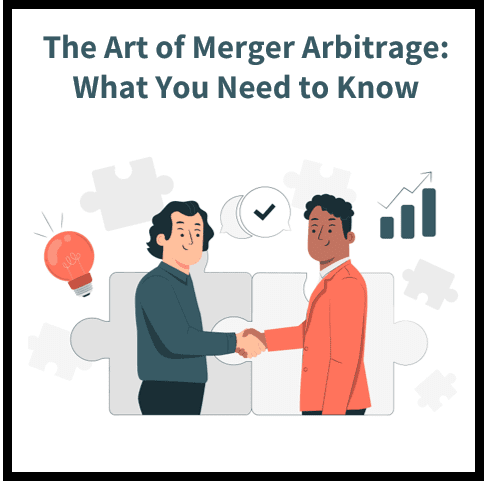Merger arbitrage is an investing strategy that involves simultaneously buying and selling the same securities at different prices. It’s most profitably exploited when a merger between two companies comes with a bonus of either a potential price drop in the acquired company’s shares or an opportunity to buy cheap stock of the acquiring company before it rises.
Thankfully, plenty of these opportunities present themselves from time to time. But crafting a successful merger-arbitrage strategy isn’t as simple as it might seem. There are plenty of pitfalls and risks to avoid, even if you have the experience necessary to identify opportunities with high probability for success. This article will arm you with everything you need to know about merger arbitrage so that your next attempt is more successful than your last one.
What is Merger Arbitrage?
Merger arbitrage is a trading strategy that involves buying and selling the same securities at different prices. It’s most profitably exploited when a merger between two companies comes with a bonus of either a potential price drop in the acquired company’s shares or an opportunity to buy cheap stock of the acquiring company before it rises. In the event of a merger between two companies, the acquiring company will often offer a combination of cash and stock to shareholders of the acquired company.
Investors who own shares of the acquired company will often prefer the cash because it’s more straightforward; you get a set amount of money that’s easy to value. But shareholders of the acquiring companies are often more interested in shares of the acquired company. And if they end up with a majority of shares, they’ll be able to carve the acquired company up and sell its pieces. This is why investors in acquiring companies sometimes prefer stock. It gives them more control over what happens to the combined company.
How Does Merger Arbitrage Work?
Merger arbitrage exploits the differences in price between two companies. It relies on the assumption that, in the long term, these prices will be driven towards each other. For example, let’s say Company A is trading at $10 per share and is trying to acquire Company B. Shareholders of Company B are offered $12 per share in either cash or Company A shares. Company B shareholders would prefer the cash, but Company A shares are priced at $20 per share.
You buy Company A shares and sell Company B shares. If the merger goes through, Company B shares will trade above $12 per share. You can then buy back Company B shares and sell Company A shares. If the merger doesn’t go through, you can buy back Company B shares at the same price you sold them for and keep the profits from the Company A shares.
Step 1: Find the Mergers You’ll Trade
You don’t want to simply involve yourself in any merger that comes along. You need to be selective and only choose mergers that are likely to result in a price differential between the two companies’ shares. The best way to find these mergers is by using a financial news aggregator and subscribing to a variety of financial newsletters that specialize in merger arbitrage. You can also create your own alerts by entering the ticker symbols of the companies you’re keeping an eye on into financial news aggregator websites and setting notifications for yourself when a merger appears.
Step 2: Determine Which Company is the Acquirer
The first thing you need to do is determine which company is the acquirer in the merger. You want to be sure you’re buying shares of the acquiring company if you hope to make a profit on a price differential. The two companies’ stock prices will likely fluctuate on a day-to-day basis, so it’s important to keep an eye on the shares during the lead-up to the merger. This will let you know which is the acquiring company at any given time.
Step 3: Decide Which Company You’ll Buy and Which You’ll Sell
Once you’ve determined which company you’ll buy and which you’ll sell, you can move on to deciding what price you’ll buy and sell each at. This is where your experience as a trader will come in handy. You can expect the acquiring company’s shares to rise somewhat, but the acquired company’s shares will likely fall significantly. This is because acquiring companies often overpay for the companies they buy with the intention of carving them up and selling their parts.
The most common mistake made by new merger arbitrage traders is selling the shares of the acquired company too early. It’s natural to think that the acquired company’s shares will drop significantly. But many mergers don’t go through, or they get delayed or called off. This means that the acquiring company’s shares may fall but may not fall as low as you’d expect them to. And the acquired company’s shares may fall less than you’d expect because they still have the potential to be bought out even if the current merger fails.
Step 4: Determining Your Risk Tolerance and Stop-Loss Point
Merger arbitrage is an excellent strategy for experienced traders because it isn’t a get-rich-quick scheme. It requires patience, as well as a certain level of risk. Mergers take months to go through, so you’ll have to have a high risk tolerance and be able to hold onto your shares for a significant period of time.
And because the price of the acquiring company’s shares will likely fall somewhat during this time, you’ll need to set a stop-loss point on your shares. This is the price at which you sell your shares if they fall below a certain level. The stop-loss point is important because it lets you know when to get out of a trade that isn’t working out. It’s important to know when to cut your losses so that they’re limited.
Common Mergers That Create Opportunities for Merger Arbitrage
Mergers are always likely merger arbitrage opportunities. But certain types of mergers are more likely to result in significant share price fluctuations than others. These include: – Megamergers: When two massive companies decide to go toe-to-toe, it’s likely that only one will emerge as the dominant player. This means share prices will likely fall significantly. –
Consolidations: When two companies decide to merge and carve up their respective industries, it’s likely that smaller, weaker players will be caught in the crossfire. – Acquisitions of companies that have seen their share prices fall significantly: When a company makes an acquisition and announces its plans to carve up the acquired company, its shares are likely to fall.
Who Can Benefit from Merger Arbitrage?
Anyone can benefit from merger arbitrage. But it’s a particularly good fit for long-term investors who are willing to risk a little bit of money in hopes of reaping big rewards. If you’re looking for a quick profit, you’re better off trading in and out of stocks with high-risk strategies like day trading or high-frequency trading.
Merger arbitrage takes a long view, meaning it’s best for those who can hold their positions for months on end. If you’re interested in making a long-term investment, merger arbitrage is likely a good fit for you. It’s a low-risk strategy that can be rewarding if you do your research and find the mergers that are likely to create significant price differentials between the two companies’ shares.
The Risks of Merger Arbitrage
Merger arbitrage is low-risk. The only real risk is that the merger doesn’t go through or takes longer to go through than expected. Companies can call off mergers for any number of reasons. These include regulatory approval issues and concerns over how the acquisition will affect the acquiring company’s earnings per share. Mergers can also take much longer than expected. This often happens when the acquiring company has to negotiate with the acquired company over the terms of the deal.






14 thoughts on “Merger Arbitrage 101: An Introduction to the Art of Profiting from Merger Deals”
[…] short, conducting financial due diligence is a critical step in the mergers and acquisitions process that helps the buyer make informed decisions, structure the transaction […]
Very interesting information!Perfect just what I was looking for! “Oh, I don’t blame Congress. If I had 600 billion at my disposal, I’d be irresponsible, too.” by Lichty and Wagner.
Your article helped me a lot, is there any more related content? Thanks!
Thanks for sharing. I read many of your blog posts, cool, your blog is very good.
Thank you for your sharing. I am worried that I lack creative ideas. It is your article that makes me full of hope. Thank you. But, I have a question, can you help me?
Your article helped me a lot, is there any more related content? Thanks!
Your article helped me a lot, is there any more related content? Thanks!
I don’t think the title of your article matches the content lol. Just kidding, mainly because I had some doubts after reading the article.
401370 545908You could surely see your enthusiasm in the function you write. The world hopes for a lot more passionate writers like you who arent afraid to say how they believe. Always go after your heart. 603154
938504 999629Yeah bookmaking this wasnt a risky decision outstanding post! . 487842
Can you be more specific about the content of your article? After reading it, I still have some doubts. Hope you can help me.
Your point of view caught my eye and was very interesting. Thanks. I have a question for you.
Thanks for sharing. I read many of your blog posts, cool, your blog is very good.
779178 477351Hello! I just now would decide on to supply a enormous thumbs up with the wonderful details you could have here within this post. I will be coming back to your weblog internet site for additional soon. 846964